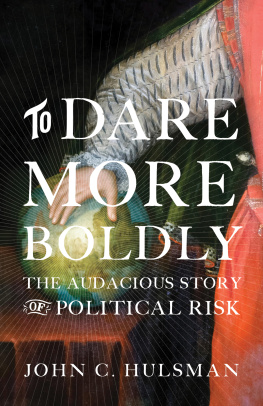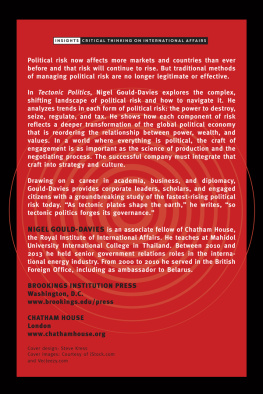To Dare More Boldly
To Dare More Boldly
THE AUDACIOUS STORY
OF POLITICAL RISK
John C. Hulsman
PRINCETON UNIVERSITY PRESS
Princeton & Oxford
Copyright 2018 by Princeton University Press
Published by Princeton University Press,
41 William Street, Princeton, New Jersey 08540
In the United Kingdom: Princeton University Press,
6 Oxford Street, Woodstock, Oxfordshire OX20 1TR
press.princeton.edu
Jacket art: Detail of Portrait of Sir Francis Drake (154096), oil on panel
by unknown artist, c. 1581. IanDagnall Computing / Alamy Stock Photo
Jacket design by Kathleen Lynch / Black Kat Design
All Rights Reserved
ISBN 978-0-691-17219-4
Library of Congress Control Number: 2017962507
British Library Cataloging-in-Publication Data is available
This book has been composed in Minion Pro
Printed on acid-free paper.
Printed in the United States of America
1 3 5 7 9 10 8 6 4 2
This book is for Benjamin, Matilda, and Samuel;
you are all I have to offer the world, but you are far
more than enough.
Disturb us, Lord, when we are too well pleased with ourselves
When our dreams have come true because we have dreamed too little
When we arrive safely because we sailed too close to the shore.
Disturb us, Lord, to dare more boldly, to venture on wider seas
Where storms will show your mastery
Where losing sight of land, we shall find the stars.
Excerpts from Sir Francis Drakes prayer, 1577 (apocryphal)
To Dare More Boldly
CHAPTER ONE
480 BC: Introduction
THE FIRST POLITICAL RISK ANALYSTS:
THE PYTHIA OF DELPHI
The Pythia as the Worlds First Political
Risk Consultant
In 480 BC, the citizens of Athens found themselves in more trouble than the modern mind can imagine. Xerxes, son of Darius the Great of Persia, King of Kings, King of the World, had some unfinished business left to him by his all-powerful father. A decade earlier, at the Battle of Marathon in August 490 BC, the impossible had happened. The little-regarded Athenian army had seen off Darius and his mighty horde, saving the fragile city-state from certain destruction. Now Xerxes had invaded the Greek mainland again, to finish what his father had started.
Judging by his past record, the Athenians knew better than to expect mercy from the great king. Upon ascending the throne, Xerxes had savagely crushed two rebellions by portions of his empire then thought to be infinitely superior to the little city-state that was Athens. In 484 BC, Xerxes had quashed a revolt in Egypt, devastating the Nile delta. Soon after, he decisively put down efforts to throw off his yoke in Babylon, going so far as to pillage the sacred Babylonian temples. Xerxes was a man who saw every form of dissent as sacrilege; the Athenians knew they could expect no quarter from the Persian king should they fail.
Just to make sure that this time Athens did not escape the wrath of the Persian Empire, Xerxes assembled the largest invading force the world had ever seen. While the Greek historian Herodotustypically exaggeratingput the Persian numbers at 5 million, modern-day historians still place them at an overwhelming 360,000, with a gigantic armada of 700 to 800 ships in support of this vast host.
Confronted with almost certain annihilation, what did the Athenian leadership do? What was their response to a problem that in terms of both its size and its likely devastating impact seemed insurmountable?
Simple. They requested the services of the worlds first political risk consultant.
The Pythia Masters the Persians
By 480 BC, the Pythia of Delphi already amounted to an ancient institution. Commonly known now as the Oracle of Delphi (when in fact the oracles were the pronouncements the Pythia dispensed), the Pythia were the senior priestesses at the Temple of Apollo, the Greek God of Prophecy.
The temple, sitting precariously (and beautifullythe site is still a wonder to behold) on the slope of Mount Parnassus above the Castalian Spring, had long been the center of the Greek world, going back into the mists of time. The site may well have had religious significance as early as 1400 BC, during the forgotten days of the Mycenaeans, with devotions to Apollo being established in the eighth century BC. Delphi remained a center of worship until 390 AD, having been in use for at least 1,100 years.
During this long period, the Pythia was seen as the most authoritative and important soothsayer in Greece. Pilgrims descended from all over the ancient world to visit the temple and have their questions about the future answered. Sitting in a small, enclosed chamber at the base of the edifice, the Pythia delivered her oracles in a frenzied state, most probably imbibing the vapors rising from the clefts of Mount Parnassus.
We know a good deal about how the oracles came to pass. For a time during the period of Roman domination, the Greek historian Plutarch served as high priest at Delphi, assisting the Pythia in her mission. Perched above the major cleft in the rock, the Pythia would be sitting in a perforated cauldron astride a tripod. It was reported by pilgrims that as the Pythia imbibed the vapors rising from the stone her hair would stand on end, her complexion altered, and she would often begin panting, with her voice assuming an otherworldly tone, not quite human. In classical days, it was asserted that the Pythia spoke in rhyme, in pentameter or hexameter.
To put it in modern terms, there is little doubt that the Pythia did see visions and underwent a dramatic transformation while in the temple; she was clearly as high as a kite. Plutarch himself believed that her oracular powers were directly associated with the vapors that emanated from the Kerna spring waters that flowed underneath the temple, vapors that may well have been full of hallucinogenic gas.
We now know that two tectonic plates intersect beneath Mount Parnassus; such a fault line creates many crevices in the earth, through which gases can rise. Recent tests have found ethylene in the spring water near the site of the Temple of Apollo. It is the most likely cause of the Delphic prophesies.
Ethylene is characterized by its sweet smell and produces a narcotic effect described as floating or disembodied euphoria. As described in detail by Plutarch, the experiences of the Pythia in action match the effects of ethylene. Under the influence, a persons tone of voice alters and speech patterns change, yet they retain the ability to answer questions logically. With exposure to higher doses of the drug, the person thrashes about wildly, groaning in strange voices, frequently falling to the ground, all behaviors tracking with eyewitness accounts of the Pythias behavior.
The Greeks believed that Apollo possessed the Pythias spirit when she was delivering her oraclesa point at which she was intoxicated by the vapors. They saw her prophecies as religious in nature, but lets look at them afresh. For I think the Temple at Delphi amounts to nothing less than the worlds first political risk consulting firm.
At least since the days when the Athenians consulted the Pythia during the height of the Persian Wars, political and business leaders have looked to outsiders blessed with seemingly magical knowledge to divine both the present and the future. While the tools of divination have changed through the ages, the pressing need for establishing rules of the road to manage risk in geopolitics have not. The question remains: through superior knowledge (either intellectual or spiritual in nature), can we reliably do this?
During the period of the Pythias ascendance, pilgrims brought animals to Delphi for sacrifice to Apollo, as well as a monetary fee for the privilege of using the Pythias services. Of the petitioners who waited for the one day of the month the Pythia deigned to reply to their questions, those who brought larger donations to the god secured an advanced place in line. Political risk has always been a business that directly links analysis to monetary rewards.








